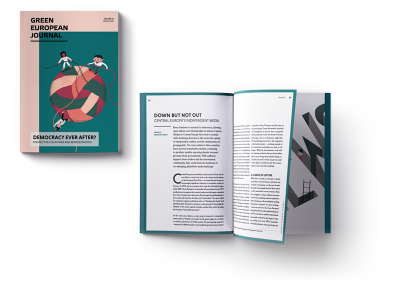This article is part of a panorama in which eight analysts from around Europe look at how referendums are used or misused, and how they shape public debate. The series explores the role of referendums throughout Europe: how they drive change, whether progressive or reactionary, and foster common understandings crucial for functioning democracies.
If democracy is a concept, it is made manifest in a country’s constitution; in effect, its aspirations in legal form. Ireland’s constitution was born out of war, out of the desire for independence after 700 years of British rule and occupation. It was written in 1922 by men and women who had succeeded in that struggle and was redrafted when Ireland became a fully independent republic in 1937. The battle for this status left an indelible mark on the Irish political system, which is only now, 100 years on, beginning to loosen its grip and change to reflect a 21st-century republic.
A side effect of the Irish nation’s turbulent birth is a healthy respect for, and interest in, the constitution. Its very existence became a sign of that achievement, and of freedom; a living document in which neighbours, friends, and family had invested – quite literally – blood, sweat, and tears. As a result, since it was written, Irish citizens, no longer subjects of a foreign crown, have had genuine reason to be proud of their constitution and to feel some ownership of and investment in it.
It is therefore hardly surprising that this document, as a declaration of our “fundamental law”, would, over time, require updating and amending, especially as it was created and written in the 1930s with the invited influence of the then all-powerful Catholic Church. That influence proved over time to be stifling and ultimately out of step with a modern state taking its place in the world.
Since it was written, Irish citizens have had genuine reason to be proud of their constitution.
Since 1937, there have been 42 referendums on which citizens have voted. Not surprisingly, the number of referendums has accelerated in this century. Nineteen have taken place since 2000, with the last one in 2019. In my five-year term as a senator in the Seanad, between 2011 and 2016, there were eight referendums. The highest turnout in this period was 62.1 per cent for the marriage equality amendment in 2015, which was carried. This was later trumped by the referendum on an amendment to provide for abortion in 2018, which had a 64.1 per cent turnout. Amendments with a clear social impact have always been the most febrile and have the capacity to connect directly with the lives of voters, ensuring lengthy and heated debates on doorsteps and in TV and radio studios.
And, by 2015, social media had emerged as a strong influencer, activating and connecting younger voters. The hashtag campaign #HomeToVote resulted in thousands of young Irish people making extraordinary journeys across the globe to cast their vote for marriage equality.

This was the first time in Irish history that younger voters were, as one group, determined to make their voices heard. It proved immediately how the power of participation enhances a democracy, and how vital it is for governments that propose constitutional amendments to make genuine efforts to reach all age and gender groups. In the future, this inclusion effort must see postal voting introduced in Ireland, as it remains the single biggest bar to access to voting.
In addition, the current independent Referendum Commission, which works to explain the meaning of referendums and to advertise them, should become permanent, be a bastion for best practice, and have a role in advising on the wording of amendments that are put forward. The current commission is not permanent and is limited to providing advice about what the referendum means, as well as circulating non-partisan information.
The increasing number of referendums in recent years has provoked much discussion on whether a “Super Tuesday”-style approach should be adopted, allowing voting on many referendums on the same day. Given the confusion that arose on the few occasions multiple amendments were offered on the same day, this would appear to serve little purpose apart from saving money.
In fact, such an approach could devalue the entire process and disrupt the existing respect which voters have for the right to amend the constitution – carefully and with time to consider the options. The model of revitalising the constitution through careful consideration by the people via a referendum offers the best choice to allow change and progress in how a country shapes its own legal framework. And already, the value of the Citizens’ Assembly and the earlier Convention on the Constitution in providing recommendations to the government on potential changes to the constitution has given citizens a more direct role in shaping that framework. Ireland, in this new century, has benefited overall by continuing to include citizens in such key decisions.

